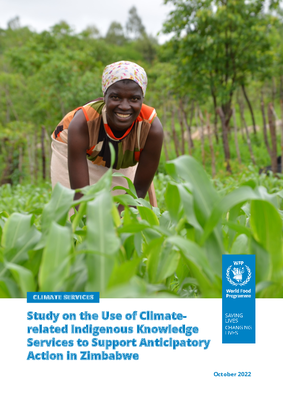Study on the Use of Climate-related Indigenous Knowledge Systems to Support Anticipatory Action in Zimbabwe, October 2022
The United Nations World Food Programme (WFP) is piloting the Anticipatory Action (AA) approach in Zimbabwe. AA is designed to manage climate risks by acting in anticipation of severe weather events, based on weather forecasts and pre-positioned financing. This study was commissioned to investigate possible pathways for the integration of indigenous knowledge systems (IKS) in the decision-making processes within the AA approach.
The World Meteorological Organization (2013) notes that ‘... a climate service is a decision aide derived from climate information that assists individuals and organizations in society to make improved ex-ante decision-making.’ Climate-related IKS are used traditionally in many parts of the world to provide climate services. The definition of IKS used for the purposes of this report is given in Section 1.5.
A more complete understanding of current use of IKS in climate forecasting amongst the targeted communities is necessary before their integration into AA. This document details the processes and findings of a study commissioned by WFP Zimbabwe in June 2021 to investigate the current state and use of climate-related IKS in four districts of Zimbabwe: Mbire, Matobo, Mudzi and Binga.

Resource Type
PDF, 7.63 MB
Year
2022
Country
Zimbabwe
Region
Africa
Content Type
Case Study
Theme
Early Action
Organization
WFP

